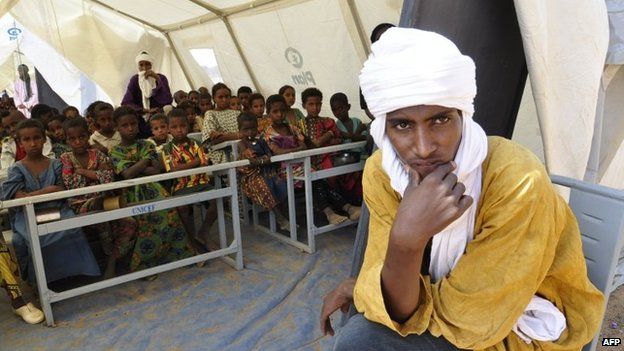Mali intervention by Ecowas: Refugee fears
- Published

Some 400,000 more people could be made homeless in Mali if West African armies try to oust Islamists from their northern stronghold, a confidential United Nations report warns.
Armed groups, some linked to al-Qaeda, took control of northern Mali in April.
Neighbouring countries are drawing up plans to reconquer the area, subject to UN backing.
But as well as a refugee crisis, the UN report, seen by the BBC, warns of possible Islamist counter-attacks.
The report is written by a United Nations aid co-ordination body called the Inter-Agency Standing Committee.
I have not been able to obtain a complete copy but have key sections. They set out four main scenarios escalating from the current status quo to an all-out war with the Islamists attempting to advance south on the capital, Bamako.
A senior UN official close to the authors stressed that the scenarios were not predictions.
"This is humanitarian planning," he said.
"We're not saying we think this or that will happen. We're just drawing up contingency plans."
The report says the fallout from the military coup d'etat of March 2012, when the elected government of Amadou Toumani Toure was overthrown, "requires us to plan for plausible scenarios".
The coup took place while a mixture of Tuareg nationalists and Islamists took control of the north. Many of the insurgents were men who had worked for Muammar Gaddafi and left Libya to return home well-armed after his death.
The poorly-equipped army imploded militarily but ended up in charge of Bamako.
West African leaders took the lead in condemning the coup.
Mali was one of the first African countries to experience a "People Power" democratisation when Moussa Traore was chased from office in 1991.
So regional leaders strong-armed the military leader, Captain Amadou Sanogo, to appoint an interim civilian leadership led by a prime minister.
However, this month the prime minister was arrested by soldiers and a new one was appointed - indicating that the military still has considerable power.
So West African leaders have been forming an international force which may have a dual role - restoring constitutional rule in Bamako and re-taking the north.
This force is seeking a United Nations mandate as well as finance and logistics - so its deployment does not appear to be imminent.
The first scenario is a progressive deterioration of the current status quo with the prospects for dialogue between the belligerents being "bogged down".
Criminality and insecurity persist. This scenario lists the main armed groups in the north:
- Mujao (The Movement for Unity and Jihad in West Africa)
- Ansar Dine (Arabic for Defenders of the Faith, led by Iyad Ag Ghaly)
- Aqim (Al-Qaeda in the Islamic Maghreb)
- Boko Haram (Hausa name means "Western education is sinful" - Nigerian-based)
- MNLA (National Movement for the Liberation of Azawad - ethnic Tuareg separatists).
The second projection envisages the intervention of the Malian army in the north, backed by troops from the Economic Community of West African States (Ecowas).
This leads to violent confrontations with the above-listed groups, while militiamen from other countries "of the north" reinforce the Islamist/Tuareg groups.
The destruction and looting of public institutions is widespread (although the authors do not say by whom). Farmland crops are also destroyed.
The authors say Islamist "sleeper cells" will be activated to organise attacks in southern Mali "as well as in the Ecowas troop-contributing countries".
There will be socio-political unrest in Bamako led by "anti-Ecowas groups". Roadblocks and checkpoints will proliferate.
The third scenario describes the prospect of political and military destabilisation in the face of the threat of Ecowas intervention.
Divisions in the army are exacerbated with violent clashes between factions.
Scores are settled by soldiers isolated from what the authors describe as "the junta".
Sanctions are applied by Ecowas, the African Union and the UN.
Borders are closed; the economy is frozen - with possible severe shortages of fuel and other goods.
Aid programmes are suspended and some aid workers evacuated. An "external force" intervenes "to secure institutions in Bamako" (although this is not described as the full Ecowas contingent).
The fourth projection leads to the most widespread violence and the largest number of refugees/displaced people.
The Islamist groups advance south on the towns of Mopti, Sevare and Segou and clash with the Mali army. Attacks are mounted by Islamist cells in Bamako.
Armed groups recruit child soldiers and are reinforced from abroad.
The application of Sharia spreads - but at the same time there is an increase in illegal arms dealing, drug smuggling and people trafficking.
It may be that none of these scenarios is played out - or that just parts of them are.
Another possibility is that a negotiated settlement is hammered out between the Islamists and the Tuaregs on one side and the Bamako politicians and soldiers on the other.
But if a political settlement is reached, it may be that the Ecowas force is maintained in the background as a sort of insurance policy.